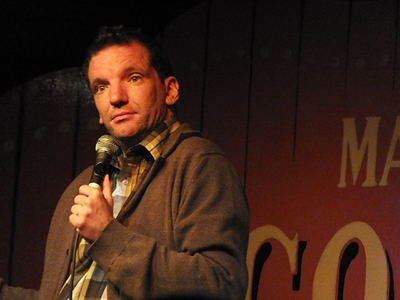 Henning Wehn
Henning Wehn
Henning Wehn is a stand-up comedian based in London. He is originally from North Rhine-Westphalia and came to the UK in 2002. He started on the comedy circuit as a warm-up act for other comedians and promotes himself as the ‘German comedy ambassador in London’. He has appeared regularly on British TV and radio programmes. His popular shows contain a lot of references to cultural and linguistic stereotypes.
Activity 2
Read the transcript, from Henning Wehn's comedy show in front of a Scottish audience.
As you read, which of these stereotypes about Germans does he mention?
|
|
|
|
|
|
|
|
|
|
|
Henning Wehn:
"Now let me get one thing straight. We Germans, we like a laugh. Just like you Brits. We really do. The only difference is we Germans, we laugh once the work is done. While you laugh instead of doing any meaningful work. And that, innit, is the main culture difference.
And I must admit, I’ve never, ever done stand-up back home. Never, ever. Reason being, I’m not good enough to cut it in Germany. If you want to have success as a stand-up in Britain, all you have to do, loads of swearing. And in Germany, we don’t swear at all. Reason being, things work. That isn’t even a joke.
What can I say? Now, after nine years in Britain, I’m so familiar with your stereotypes about us that nowadays, whenever I travel back to the fatherland, I almost expect to find my countrymen goose-stepping up and down the high street, dressed in lederhosen, eating a sausage. Yum, yum, yum. A beach towel under one arm. And all that while singing David Hasselhoff’s latest songs. It’s nonsense. Nonsense. We only sing the ’Hoff’s old ditties.
At the same time, in Germany, we have got absolutely no stereotypes, let’s say, about you Scots. We really don’t. Because you’re not important enough to us. Honestly, we’re far too busy slagging off the f****** Dutch and Danes and Poles and Turks and French, and all those other flukes of history."
Activity 3
Now read the next section from his performance, and list his stereotypes of the British.
Henning Wehn:
"And it’s difficult to define Britishness, isn’t it? Who is British, what is British? I firmly believe proof of your national identity, it’s in your behaviour. And based on that, I’ve invented a fool-proof Britishness test.
What I do is I go down the supermarket, grab a trolley, put a few heavy things in it, then accelerate down the aisle, looking for someone with their back turned to me. And then, just before maximum impact, I pull the trolley back, and I’m pushing as hard as I can into that fella, aiming for the ankle. If everything goes according to plan, that fella will be flying and all. And if he then gets up and says, ‘sorry’, jawohl, you are truly British. Here’s your passport. And an After Eight.
Because you love the After Eight, don’t you? Come on. Even here in Scotland. Don’t deny it. I know you lot. I’ve been here nine years. You’re mad for the After Eight. Come on, don’t deny it. I’ve been here long enough. I know you lot. You wake up in the mornings, in your castles. And then you go fox-hunting. And then the tailor comes round to take measurements for your new tweed jacket. And then you play croquet. And then you birch your servants. For the sheer joy of it.
And then you go, ooh! Been a jolly good chap all day. Think I deserve a little treat. Ah. It’s five past eight. And I’m going to treat myself with appallingly tasting mixture between mint and chocolate. Yes, that’s how I roll."
You may also have noted that his description of the Germans at the beginning of the extract implicitly includes mirrored stereotypical views of the British, i.e. they don’t always work very hard, and things don’t work.
Activity 4
Now think about how you felt when reading his performance and what you thought of Henning Wehn’s type of humour. What was your response to this? Did anything make you feel uncomfortable? If so, why do you think you had this reaction?
Later we will return to how national stereotypes such as the ones exploited in the joke might arise and whether there sometimes is a ‘kernel of truth’ in them. First, let’s have a look at how to define the term ‘stereotype’.
- You can view the video of Henning Wehn's perfromance on YouTube here. Please note some of the material could be deemed as offensive.
This article is part of a wider collection of articles and activities on the subject of stereotypes. You can view the full collection here.
Rate and Review
Rate this activity
Review this activity
Log into OpenLearn to leave reviews and join in the conversation.
Activity reviews